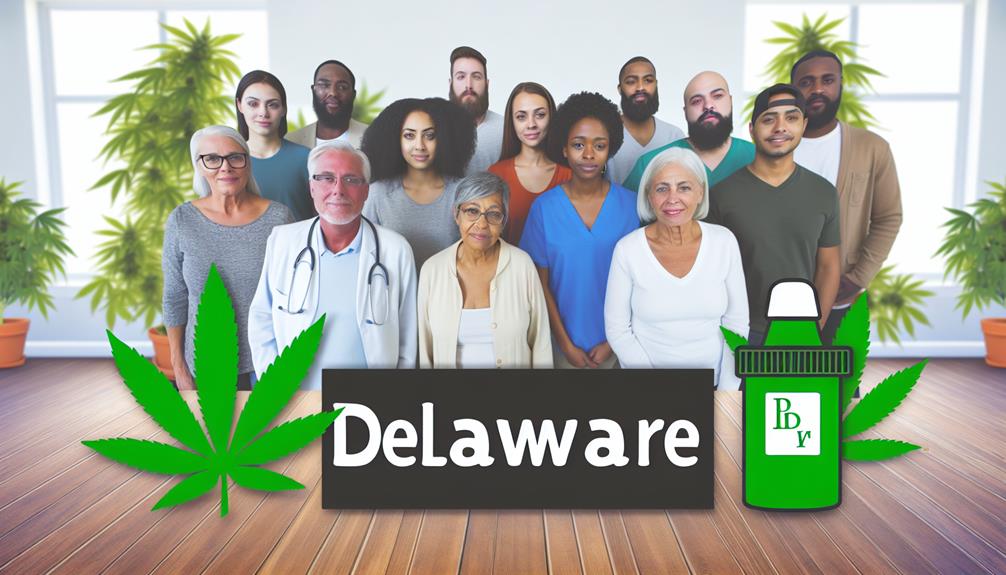Did you know that the number of qualifying conditions for medical marijuana in Delaware has increased by 50%? That’s right, you or someone you know may now be eligible for cannabis-based treatments under the state’s expanded program. But what does this mean for patients, caregivers, and healthcare providers? There’s a lot to unpack in understanding how these changes can impact your health management strategy or professional practice. Stick around; we’ve got some essential points to discuss.
Table of Contents
Overview of Delaware’s Medical Marijuana Program

Established in 2011, Delaware’s Medical Marijuana Program is a state initiative designed to provide safe access to medical cannabis for patients with specific debilitating conditions. The program history is marked by a commitment to enhancing the quality of life for individuals who haven’t found relief through traditional medicine.
You’re probably wondering who’s eligible? Well, the eligibility criteria are quite specific. Patients must be Delaware residents and have one or more of the qualifying conditions. These include severe, debilitating conditions such as cancer, Alzheimer’s disease, and chronic pain among others.
Physicians must certify that traditional treatments have failed to alleviate symptoms before a patient can be considered for the program. Furthermore, patients must not be part of any other state’s medical marijuana program.
To prevent misuse, the program also includes strict rules regarding the amount of cannabis a patient can possess and guidelines for its safe use.
The intent behind this program is clear: balance patient access needs with responsibility to prevent misuse. It’s an initiative built on compassion and respect for law and order. Understanding its history and criteria helps you better serve those who benefit from it.
Key Changes in the Expansion

As we navigate the intricacies of Delaware’s Medical Marijuana Program, it’s essential to highlight the strides made in its recent expansion. The changes are extensive, impacting both cultivation guidelines and the list of qualifying conditions.
The revised cultivation guidelines now allow for an increased plant count, a significant shift from previous limitations. This change aims to meet growing demand, ensuring that you as a provider can adequately supply your patients without legal ramifications.
The new guidelines also enforce stricter quality control measures, requiring regular inspections and thorough record-keeping. This ensures that the marijuana you cultivate is safe and free from harmful contaminants.
Next, let’s look at the expansion of qualifying conditions. Previously, the list was relatively narrow, limiting the number of patients who could legally access medical marijuana.
Now, with widened scope including conditions like chronic neuropathic pain and autism with aggressive behavior, more patients can potentially benefit from this treatment option. The expanded list implies a more inclusive approach allowing you to better serve your patients by offering them an alternative treatment option.
Impact on Patients and Caregivers

While the expansion of Delaware’s Medical Marijuana Program is certainly beneficial for providers, it’s important to contemplate its significant impact on patients and caregivers.
The expansion paves the way for enhanced patient access. Patients now have a wider range of options when it comes to medical marijuana products. This increased accessibility could lead to improved symptom management and better overall health outcomes.
It’s not just about having more choices, but about having the right choices that fit each patient’s unique needs.
Caregiver roles are also evolving with this expansion. As a caregiver, you’ll notice that your responsibilities might increase as you’re now tasked with understanding the new options available and making informed decisions on behalf of the patients.
This could mean more time spent on research and consultation, but also the potential for more effective care delivery.
Yet, it’s vital to remain aware of potential challenges. The expansion could mean more complex regulations to navigate, which might cause stress for both patients and caregivers.
Consequently, staying informed and prepared is crucial as this pivotal change in Delaware’s healthcare landscape unfolds.
Implications for Healthcare Providers

Moving from the perspective of patients and caregivers, let’s shift focus onto healthcare providers who are also deeply influenced by the expansion of Delaware’s Medical Marijuana Program.
As a healthcare provider, your responsibilities are amplified in this new landscape. You’re not just tasked with understanding the expanded program; you’re responsible for ensuring patient safety throughout. This involves thorough education on the benefits and risks of medical marijuana use, and a mindful approach to prescribing it.
It’s also essential to grasp the intricacies of medical marijuana administration and dosage, and stay updated on emerging research in the field. This knowledge equips you to offer the best advice to your patients, ensuring their safety.
Moreover, this expansion impacts your practice’s operations. It requires you to adapt your documentation and record-keeping systems to accommodate this new treatment option.
Navigating the New Regulations

Navigating through new regulations can often feel like traversing a labyrinth. But don’t fret; we’ve got your back.
Let’s navigate together through Delaware’s medical marijuana expansion rules focusing on patient eligibility and caregiver responsibilities.
Firstly, patient eligibility has been broadened. You might be eligible if you suffer from chronic or debilitating diseases including ALS, cancer or PTSD among others.
Ensure that you get a recommendation from a licensed physician and submit an application to the State Department of Health and Social Services. It’s crucial to provide accurate, up-to-date information so that your application won’t be delayed.
Now let’s talk about caregiver responsibilities. You’re considered a caregiver if you assist a registered patient with their medical marijuana use.
Your responsibilities range from acquiring the medical marijuana from a dispensary to ensuring that the patient uses it correctly.
It’s imperative that you’re familiar with Delaware’s medical marijuana laws. The penalties for misuse can be severe.
Conclusion
Delaware’s medical marijuana expansion opens up a new horizon for better patient care. As you venture into this new landscape, remember that knowledge is your compass guiding you through the regulatory maze. Caregivers and healthcare providers, you’re the lighthouse in this sea of change ensuring safe passage for patients. Embrace these changes, navigate wisely and together we can turn over a new leaf in Delaware’s healthcare narrative.
I invite you to visit Cannabis Docs of Delaware to learn more about these exciting developments. We’re here to help you understand the changes and how they can benefit you or your loved ones. If you have any questions or need more information, please feel free to give us a call at (855) 420-6797. We’d love to hear from you!

